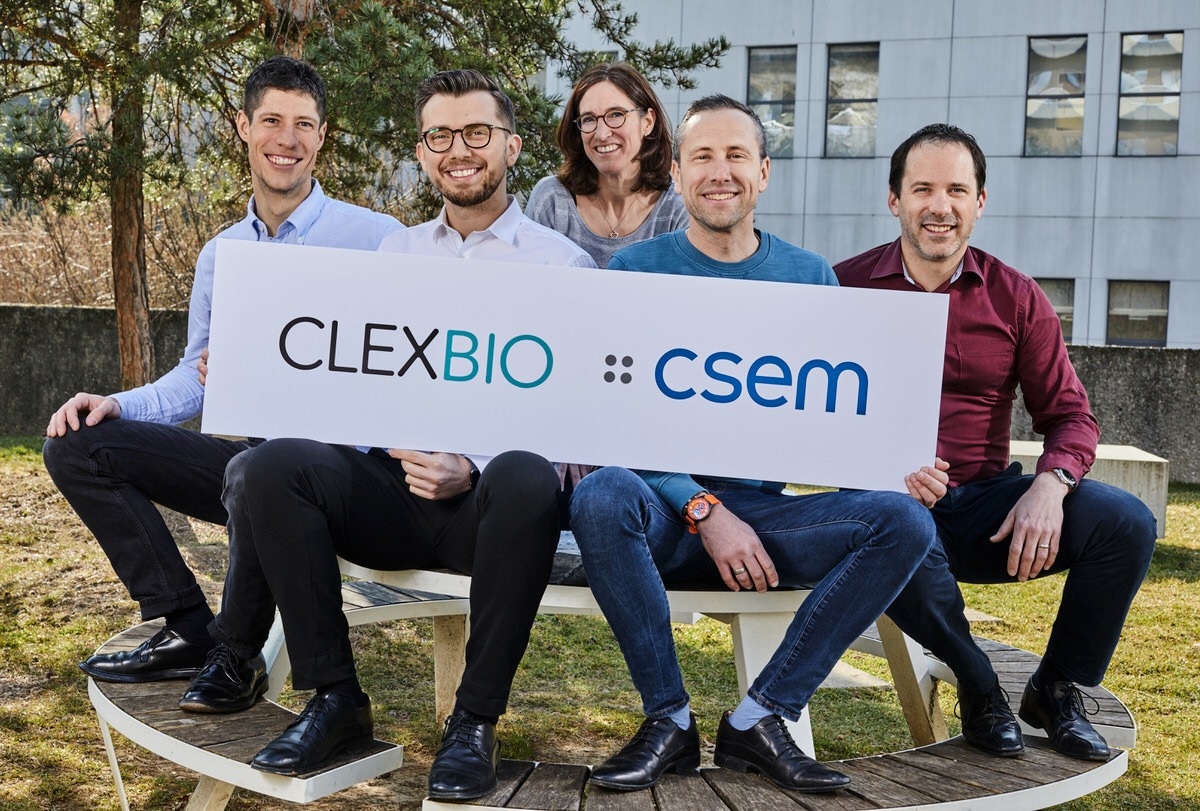From CSEMReviewed by Mychealla RiceJun 28 2022
ClexBio, a Norway-based startup, is teaming up with CSEM to develop the world’s first machine to grow tissue-engineered human veins in the lab. The joint project has received over two million Swiss francs in funding from the Research Council of Norway and aims to produce an entirely new type of vein graft that could improve the lives of the millions of people suffering from deep venous insufficiency.
 From left to right: Manuel Schweikle (CSO & Co-Founder of ClexBio), Armend Håti (CEO & Co-Founder of ClexBio), Stéphanie Boder-Pasche (Project Manager at CSEM), Gilles Weder (Group Leader Cell Microtechnologies at CSEM), and Vincent Revol (Head of R&BD, Life Science Technologies at CSEM). Image Credit: CSEM
From left to right: Manuel Schweikle (CSO & Co-Founder of ClexBio), Armend Håti (CEO & Co-Founder of ClexBio), Stéphanie Boder-Pasche (Project Manager at CSEM), Gilles Weder (Group Leader Cell Microtechnologies at CSEM), and Vincent Revol (Head of R&BD, Life Science Technologies at CSEM). Image Credit: CSEM
Severe chronic venous insufficiency (CVI) is a debilitating disease afflicting millions of people around the world. It causes a variety of symptoms including swollen, painful legs, edema, cramps, varicose veins, and ulcers. These symptoms are caused by poor circulation, which results in blood accumulating in the legs and impairs patients’ ability to walk – seriously impacting quality of life and imposing considerable costs on healthcare systems for wound care.
However, there is currently, no efficient solution. “Compression stockings remains the standard form of treatment for chronic venous insufficiency patients but the effect on ulcer recurrence and symptom relief is quite insignificant.” explains Dr. Antonio Rosales, head of the National Unit For Reconstructive Deep Venous Surgery at the Oslo University hospital (NOVI/OUS) and leading clinical collaborator of ClexBio. “An engineered vein graft would be an absolute game-changer for millions of CVI patients”, he adds.
ClexBio intends to draw on its expertise in regenerative medicine to tackle the root cause of CVI. The company has teamed up with the specialists in automations from CSEM to develop an automated process for engineering functional vein grafts comprised of pure human tissue material that integrate into the patient’s body and turn into real, living tissue. ClexBio has received 20 million Norwegian kroner (around 2,010,000 Swiss francs) in funding for this research from the government of Norway.
A biodegradable matrix to create human tissue
Veins carry blood from the organs back up to the heart using supple little valves that prevent blood from flowing backwards under the force of gravity. This complicated structure is very difficult to replicate artificially. ClexBio uses a unique approach: the company has developed a microstructured 3D biomaterial that can be combined with human cells (e.g. from a cell bank) and guide them so that they reproduce along a set pattern forming real human tissue. Once the desired tissue is formed, both cells and scaffolding are removed, leaving behind an implant composed of human extracellular matrix, a tissue-engineered vein graft.
Vein grafts made using this approach don’t provoke an immune response in patients after being implanted. Instead, they are colonized by the patient’s own cells and turn into functional tissue that integrates and grows with the body.
Producing these revolutionary implants requires a closed, high-tech bio-manufacturing system that can operate automatically. This system will be designed by CSEM’s engineers, based on their extensive experience with hydrogels, automation, and physiological microsystems.
“Using a closed system to engineer the vein grafts helps reduce the risk of contamination, ensure product quality and safety and facilitate regulatory compliance,” says Gilles Weder, the Group Leader in Cell Microtechnologies at CSEM. His colleague Vincent Revol, the head of R&BD in Life Science Technologies at CSEM, adds: “In the field of regenerative medicine, one of the biggest challenges is progressing from the lab bench to a clinical application, since that requires standardized, automated fabrication processes. New technology like this will be key to unlocking the incredible potential of novel cell and gene therapies.”
“We believe that our approach will break new ground in how we think about repairing damaged tissues and organs” says Manuel Schweikle, CSO & Co-Founder of ClexBio. Armend Håti, CEO & Co-Founder, adds: “partnering with CSEM, enables us to unlock the full potential of our tissue engineering technology and accelerate the production of human tissue implants in a safe and scalable way.”
If this R&D project is successful, it could lead to the world’s first permanent treatment for millions of suffering CVI patients globally.